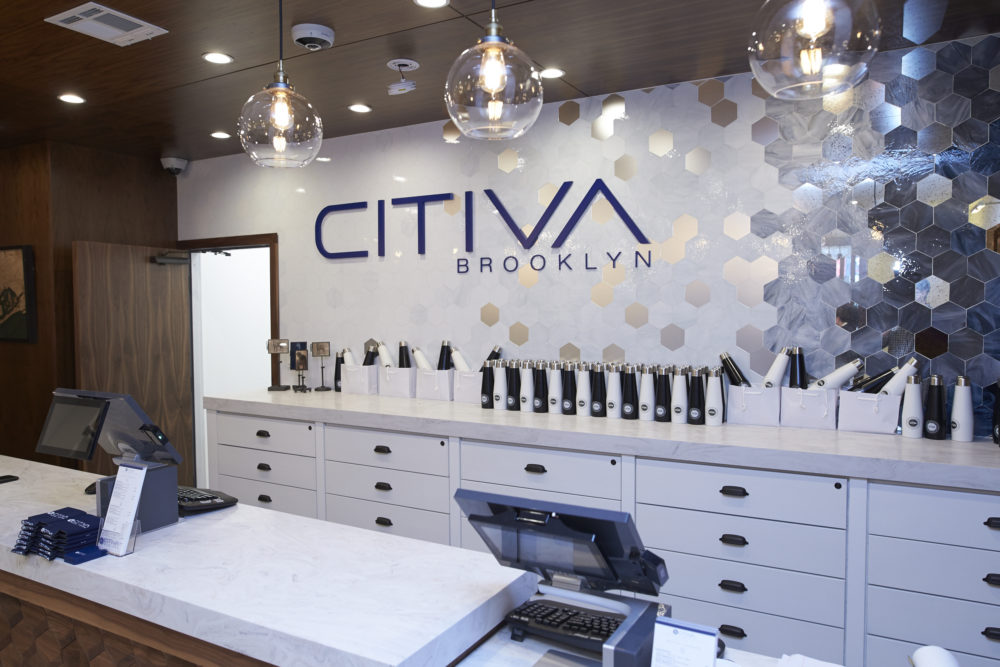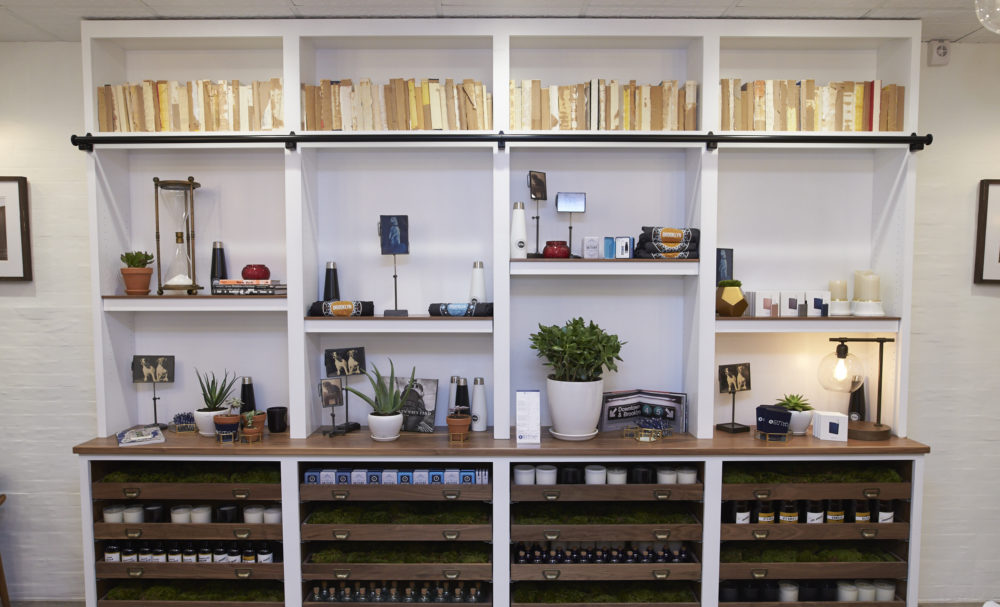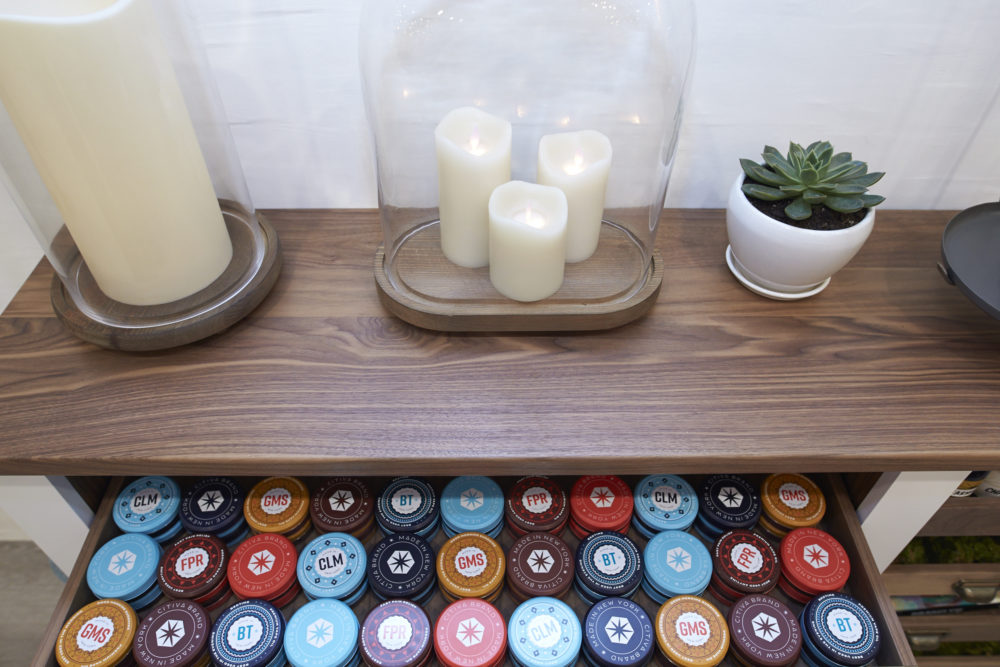Why Brooklyn’s First Marijuana Dispensary Looks Like a Spa
Medical weed arrives in a local retail store, the start of what could become a major retail industry as pot laws are eased
Citiva's front counter at its new Flatbush Avenue store (Photos courtesy of Citiva)
Your newest weed dealer just set up shop in the shadow of the Barclays Center.
But passers-by could be forgiven for assuming that the new store at 202 Flatbush Ave. is an upscale spa. Inside the sleek, ground-floor retail space, among the nostalgia-stirring photos of old New York and vintage bottles, you’ll find weathered paperbacks on shelves next to white candles and succulent plants. Natural surfaces abound, including wood-clad walls and a handmade glass mosaic by a Bushwick artist.
With the feel of a modern-day apothecary—and the perpetual presence of a licensed pharmacist—the store is now the home of Brooklyn’s first medical-marijuana dispensary.
Citiva, a New York City-based cannabinoid medicine company, opened the store on Dec. 30—a holiday-season gift for Brooklyn’s marijuana enthusiasts that also put a bow on what was another banner year for local and national cannabis liberalization. The store will sell marijuana-based capsules, liquids and oils to people who’ve opted into the state’s medical-marijuana program after receiving a prescription from a doctor.

The spa-like feel is intentional. “The store is designed to provide the most patient-friendly experience possible,” stated Carlos Perea, chief operating officer of iAnthus, the parent company. “It serves as a welcoming and educational space for people to come in and learn about cannabis as medicine.”
But the front-lobby space is open to the public, who can learn how to enroll in the program and find a physician approved for writing prescriptions. Unlike the states from Alaska to Massachusetts that have legalized recreational marijuana, New York State’s law is still restrictive. Medical-pot dispensaries aren’t allowed to sell smokeable weed or edibles, only extracts that can be ingested via a vaporizer or inhaler.
Citiva’s store will sell offerings from established providers including PharmaCan and Etain Health, as well as their own brand of vapes, capsules and tinctures, blended for use in daytime or evening hours and with their exclusive “ratios” of tetrahydrocannabinol (THC) and other ingredients.
Because the state’s Department of Health dictates what lines of cannabis can be distributed to the program participants, according to Amy Holdener, vice president of Citiva’s operations in New York, the selection in Brooklyn won’t vary much from what other dispensaries in New York City have on hand—at places like Vireo Health, in Queens, and Columbia Care and Etain’s own store, both in Manhattan. However, Holdener believes Citiva’s customers will appreciate that their products are “100% pure,” with no additives. “We’re just hoping you will be able to benefit from the quality of the products we’re bringing to market,” she said.
While Brooklyn is an obvious market for Citiva’s products, finding the precise spot for the store wasn’t easy. “We’re pretty excited,” Holdener told The Bridge. “We would’ve loved to have been open even sooner,” she continued, “but it just really takes a lot of time to find the right location under the current regulations that we have.”
By law, New York’s registered medical-marijuana businesses—of which currently there are 10—shall not “locate a dispensing facility on the same street or avenue and within one thousand feet of a building occupied exclusively as a school, church, synagogue or other place of worship,” acccording to the Department of Health’s website.

An assortment of the store’s marijuana-based products, which are packaged as capsules, liquids, and oils
Citiva had to work within those parameters, while trying to optimize patient accessibility, Holdener said. Given that the Atlantic Avenue transit hub is just steps away, the storefront on Flatbush Avenue made sense as a central location, as did the busy commercial character of the immediate area.
“We want the support of the community and support of the town leaders,” she said. “We’ve incorporated work by artists from Brooklyn within the space [and] we’re hiring staff from the area as well.”
At the October meeting of Community Board 8, whose jurisdiction includes the new dispensary’s storefront, Citiva’s Director of Medical Outreach Marc Kassman spoke about its opening. Judging by the minutes, he seemed to have been met with little opposition, fielding just two questions. Kassman was asked about marketing to children, which Kassman assured Citiva won’t ever do, and the presence of a “doctor” onsite.
(Holdener clarified the minutes’ language by saying a pharmacist will be in the store assisting customers, while the company has also employed a physician who, behind the scenes, consults with other doctors about patients seeking medical marijuana.)
Citiva’s opening also garnered the approval of Brooklyn Borough President Eric Adams. “I’m excited that Citiva has opened Brooklyn’s first regulated medical marijuana dispensary, providing valuable palliative care to certified patients in our borough,” Adams said in a press release. “My administration advocated hard for our borough to be part of the State’s medical marijuana program, and the long-awaited opening of this dispensary translates to quality local jobs and quality local access to critical health care.”
The Brooklyn store is the first brick-and-mortar location for the company, which until now has focused mostly on research, product development, and education initiatives. The company is also planning stores for Staten Island and two upstate locations.
The store on Flatbush could be just the first outpost of a much bigger local retail industry. New York State’s constrictions on product diversity seem destined to loosen. Since opposing weed during his first campaign for governor in 2010, Andrew Cuomo has mellowed on the subject, reviewing pros and cons of medical marijuana just a year later, reducing penalties for public possession of pot in 2012, and approving the state’s medical marijuana program in 2014.
Last year Cuomo launched a study of the impact that recreational marijuana legalization would have on New York. After its findings said the positives outweigh the negatives, he organized a workgroup to draft recreational-use legislation. That team then went on a statewide listening tour, hearing community concerns and opinions on what the laws should look like.
Following the governor’s lead, Mayor de Blasio has also reversed course when it comes to cannabis—sort of. Though he told the Daily News in May that he has “real concerns” about the seemingly inevitable dissolution of recreational-pot prohibition, he instructed the NYPD to cease arrests for public smoking, and to issue summonses instead. “He’ll put together a task force of city officials to lay the groundwork for full legalization,” the Daily News also wrote, “figuring out issues like how cops will deal with public smokers, what kind of zoning will be needed for pot dispensaries, and what types of public health campaigns the city should run about marijuana.”
Citiva plans to be ready to go with the flow. The company was acquired in 2017 for $18 million by iAnthus Capital Holdings, a publicly traded corporation that plans to expand into multiple states. Holdener said the acquisition has granted Citiva greater “depth of expertise” in the field, and enhanced its insight into marijuana legislation and sales trends across the U.S.
The company is also opening a cannabis cultivation and processing facility in Warwick, N.Y. In a statement about its construction, iAnthus wrote that the facility will “eventually support up to 125,000 sq. ft. of total cultivation and processing space,” and “enable perpetual harvesting, with an estimated yearly production of 2,400 kg of medical cannabis.”
“So as we potentially move to a recreational market,” Holdener said, “it’s going to allow [Citiva] to be poised to not only have the best product in New York, but have the best product at the best price.” However, she added, “That wasn’t our focus when we started; it’s still not our focus now. Our focus is solely on medical [marijuana], but with an eye on what looks to be happening [legislatively] in the state of New York.”
New York State residents can obtain a medical-marijuana program identification card by first consulting with a practitioner who’s registered with the Department of Health. Qualifying conditions for a patient’s participation in the program include cancer, ALS, Parkinson’s disease, HIV and AIDS, epilepsy, PTSD, chronic pain, and other ailments. After obtaining certification, a patient can register for the program online, and will later receive an ID card permitting them to buy products at state-registered dispensing facilities like Citiva.
—With reporting by Rachyl Houterman













